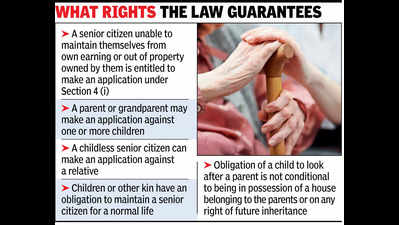Sr Citizens Act not a tool to settle property row, says HC Swati Deshpande / Apr 12, 2024,Sr Citizens Act not a tool to settle property row, says HC Swati Deshpande / Apr 12, 2024 TOI
Mumbai: Bombay high court held that the basic idea behind the Senior Citizens Act is not to nullify a validly executed gift deed, but to ensure that the elderly parents are restored the residence rights in the house that was gifted to the child/ren.
Sr Citizens Act not a tool to settle property row, says HC
Mumbai: Bombay high court held that the basic idea behind the Senior Citizens Act is not to nullify a validly executed gift deed, but to ensure that the elderly parents are restored the residence rights in the house that was gifted to the child/ren.
The judgment is significant, said legal experts. HC single-judge bench of Justice S V Marne on April 10 set aside an Oct 31, 2022, order of a senior citizens Maintenance Tribunal that had set aside three gift deeds by a widower for his share in Mumbai flats at Kandivli and Andheri to one of his three sons.
The father, represented by counsel Ameet Mehta and Sheetal Pandya, in April 2021, complained to the Tribunal, alleging ill-treatment by the son. He said he was “forced” to reside in Gujarat with another son. Aggrieved by the Tribunal’s order, the son had earlier this year approached the HC. Senior counsel G S Godbole with advocate Manuj Borkar for the son argued that the Magistrate lacked jurisdiction to set aside the gift deeds and argued that the son was one-third owner in the Andheri flat and cannot be kicked out. Justice Marne observed that the salutary senior citizens law cannot be used as a tool to settle property disputes between heirs, but in many cases, unfortunately, that is the trend.
The judgment is significant, said legal experts. HC single-judge bench of Justice S V Marne on April 10 set aside an Oct 31, 2022, order of a senior citizens Maintenance Tribunal that had set aside three gift deeds by a widower for his share in Mumbai flats at Kandivli and Andheri to one of his three sons.
The Tribunal had also directed the son to vacate two Kandivli flats with his family.The HC said the objective under section 23 (1) of Senior Citizens Act of 2007, a socio-welfare legislation, in enabling a tribunal to revoke such a gift is based on the intent to ensure the elderly’s basic needs are protected. The tribunal ought to have ensured the dad is looked after rather than revoke gift deeds, said the bench. Noting that the son was willing to let the dad reside with him and his wife and children in Kandivli, but relations had soured, the HC directed the father to reside separately in an Andheri flat. The HC also directed the son to pay a monthly maintenance of Rs 25,000 to the father.
The father, represented by counsel Ameet Mehta and Sheetal Pandya, in April 2021, complained to the Tribunal, alleging ill-treatment by the son. He said he was “forced” to reside in Gujarat with another son. Aggrieved by the Tribunal’s order, the son had earlier this year approached the HC. Senior counsel G S Godbole with advocate Manuj Borkar for the son argued that the Magistrate lacked jurisdiction to set aside the gift deeds and argued that the son was one-third owner in the Andheri flat and cannot be kicked out. Justice Marne observed that the salutary senior citizens law cannot be used as a tool to settle property disputes between heirs, but in many cases, unfortunately, that is the trend.
Under section 23 (1) of Sr Citizens’ Act, a gift deed, which is made subject to conditions that the gifting parent should be looked after, can be held null or void by a tribunal if the giftee neglects the parent. The HC, however, said that what the Tribunal exercising jurisdiction needs to see is whether the gift deed establishes such a condition of providing ‘basic amenities’, even if it is not spelt out.


Comments